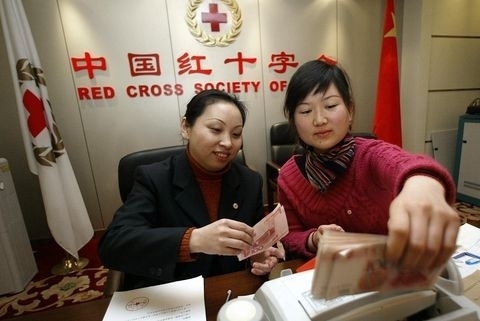

Nearly 60 percent of donations to charities end up in government coffers, according to a recent study.
The “2011 China Charity Contribution Report” was published on Jan. 8 by the China Charity and Donation Information Center of the Ministry of Civil Affairs. The report relates to NGOs in 2010.
As reported by Beijing Times, 58.3 percent of donations go to government offices or organizations affiliated with the regime, such as China Red Cross, while only 1.3 percent of donations have gone to independent charity organizations and nursing homes.
Chen Shuqing, a member of China Democratic Party, was critical over the statitics. Since the Chinese Communist Party (CCP) came to power it has monopolized social activities in the name of governance, he said, including charities. Chen said that the Party treats management of donations to charities as part of the rightful functions of government.
“Among charities, the so called ‘Red Cross’ is only an extension of the Chinese government,” he said. “The donations made by the people to the Red Cross, are actually taken by government. The government manages and distributes these donations without any proper bookkeeping; it’s difficult for people to know where these donations have been used, how much [has been used], and what it has been used on,” Chen said.
He also said that there are a number of charities that appear to be independent but which are actually affiliated with the regime.
While official charities are flush, in January China’s Foundation Center www.foundationcenter.org.cn received a joint letter from seven non-profit NGOs in the Qinba Mountain area in Northwest China, saying that they faced problems of survival.
Out of these seven, six were established around 2000. In the early days of operations, they were supported by foreign funds. But in recent years, international agencies have stopped financial support to Chinese charities. At the same time, there is very little local support.
According to the China Youth Daily, there were about 381,000 NGOs registered in China by the end of 2007—most of them are affiliated with the government. The number of non-registered self-organized NGOs is estimated to be about 3 million, the article said.
Deng Guosheng, Director of Tsinghua University School of Public Management Innovation and Social Responsibility Research Center, said in an interview with Sound of Hope radio: “Chinese grassroots NGOs were established initially with help of foreign aid, and subsequently developed well. Due to the international financial crisis, European debt situation, and slowdown of the US economy, many international NGOs have gradually withdrawn support from China. Local NGOs depend on foreign help and have no other source of support.”
Deng added that he suspects funding to have been withdrawn because of perceptions of China’s economic development—but he said that development only benefits certain sectors.
Wei Zhongping, an independent candidate running for a seat in China’s lowest-level legislature, told The Epoch Times that charitable donations in China lack proper supervision. “Where the donations have gone is not known to us, and there is no way to investigate either.”
Unaccountability erodes public trust and deters contributions, he said. Chinese media reports indicate that charitable donations fell by 80 percent from June to August of 2011, after scandals about charities came to light.
“Unlike in other countries, pop stars and entrepreneurs in China do not come forth to make donations,” Wei said. “One of the main reasons is misuse of the funds. Those who donate on goodwill get totally disappointed because they’re actually feeding some greedy ‘worms.’”
He pointed to the siphoning off of funds donated after the earthquake in Wenchuan, Sichuan Province in 2008. “An ample sum came by way of donations to alleviate the suffering of the people. But the first thing the government officials did with the earthquake donations was to buy a bunch of luxury cars.”
The Beijing Times reported a study by Deng Guosheng on that topic. He and a team of 10 conducted a four month survey of earthquake donations, and using only official figures found that 80 percent of the 76 billion yuan donated went into government accounts.
“Who would care to donate anymore?” Wei said. “The donors are all bitterly disappointed.”



